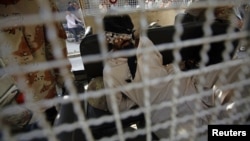Pakistan's Attorney General said Thursday that the country's security forces are holding as many as 700 people without charge as part of the fight against terrorism. Human rights advocates claim the controversial law is unjustified and open to abuse.
Attorney General Irfan Qadir told the Supreme Court that some 700 people have been taken into custody during security operations. The detainees are being held without charge in special internment centers.
Qadir told VOA that, in accordance with a law passed in 2011, the internees would only be handed over for formal prosecution once such operations are no longer being conducted.
"These laws are made for [a] war-like situation, and therefore the law provides -- the relevant section of the law provides when they are to be handed over for prosecution for the offenses they have committed, that will be the time when the operations come to an end, when the actions in aid of civil power have been concluded."
Qadir could not say how long the internees have already been held, or why they continued to be held.
The problem with the new law
Human rights activist and Pakistani Supreme Court advocate Asma Jahangir is challenging the law, which covers the northwestern Federally Administered Tribal Area -- the Taliban stronghold known as FATA.
"Well, there is no war condition in FATA, and if it is, then the government must declare it, that there is a warlike situation or an emergency there," she said.
"Secondly, there is no law that is retrospective [retroactive], and no law that will keep people under detention for [an] unknown period. And thirdly, the evidentiary value, the clauses of this law, are very defective because what it says is that the evidence of the security official shall be conclusive against the accused - so it’s a kangaroo trial," she added.
Jahangir said some people arrested without charge before the law came into effect are now being detained under the 2011 regulation.
Pakistan's Supreme Court is currently hearing a case of seven suspected militants who have been held without charge since May 2010. The seven are the survivors of a group of 11 who were detained in connection with a terrorist attack in 2007.
Pakistan's powerful intelligence agency, the ISI, produced the seven in court last February. Several were in poor physical condition. Jahangir said one family member has alleged that their relative has been tortured and that no human rights representative has been allowed to visit those being held.
Amnesty International has criticized the law, which it said provides a framework for "widespread human rights violations to occur with impunity."
In a report released in December 2012, Amnesty said many of those held in Pakistan are tortured. It said that those released alive are threatened if they speak out about their treatment in detention.
For nearly a decade, Pakistan's security agencies have been conducting operations in the country's northwest areas, where militant groups such as the Taliban and al-Qaida operate.
Attorney General Irfan Qadir told the Supreme Court that some 700 people have been taken into custody during security operations. The detainees are being held without charge in special internment centers.
Qadir told VOA that, in accordance with a law passed in 2011, the internees would only be handed over for formal prosecution once such operations are no longer being conducted.
"These laws are made for [a] war-like situation, and therefore the law provides -- the relevant section of the law provides when they are to be handed over for prosecution for the offenses they have committed, that will be the time when the operations come to an end, when the actions in aid of civil power have been concluded."
Qadir could not say how long the internees have already been held, or why they continued to be held.
The problem with the new law
Human rights activist and Pakistani Supreme Court advocate Asma Jahangir is challenging the law, which covers the northwestern Federally Administered Tribal Area -- the Taliban stronghold known as FATA.
"Well, there is no war condition in FATA, and if it is, then the government must declare it, that there is a warlike situation or an emergency there," she said.
"Secondly, there is no law that is retrospective [retroactive], and no law that will keep people under detention for [an] unknown period. And thirdly, the evidentiary value, the clauses of this law, are very defective because what it says is that the evidence of the security official shall be conclusive against the accused - so it’s a kangaroo trial," she added.
Jahangir said some people arrested without charge before the law came into effect are now being detained under the 2011 regulation.
Pakistan's Supreme Court is currently hearing a case of seven suspected militants who have been held without charge since May 2010. The seven are the survivors of a group of 11 who were detained in connection with a terrorist attack in 2007.
Pakistan's powerful intelligence agency, the ISI, produced the seven in court last February. Several were in poor physical condition. Jahangir said one family member has alleged that their relative has been tortured and that no human rights representative has been allowed to visit those being held.
Amnesty International has criticized the law, which it said provides a framework for "widespread human rights violations to occur with impunity."
In a report released in December 2012, Amnesty said many of those held in Pakistan are tortured. It said that those released alive are threatened if they speak out about their treatment in detention.
For nearly a decade, Pakistan's security agencies have been conducting operations in the country's northwest areas, where militant groups such as the Taliban and al-Qaida operate.





